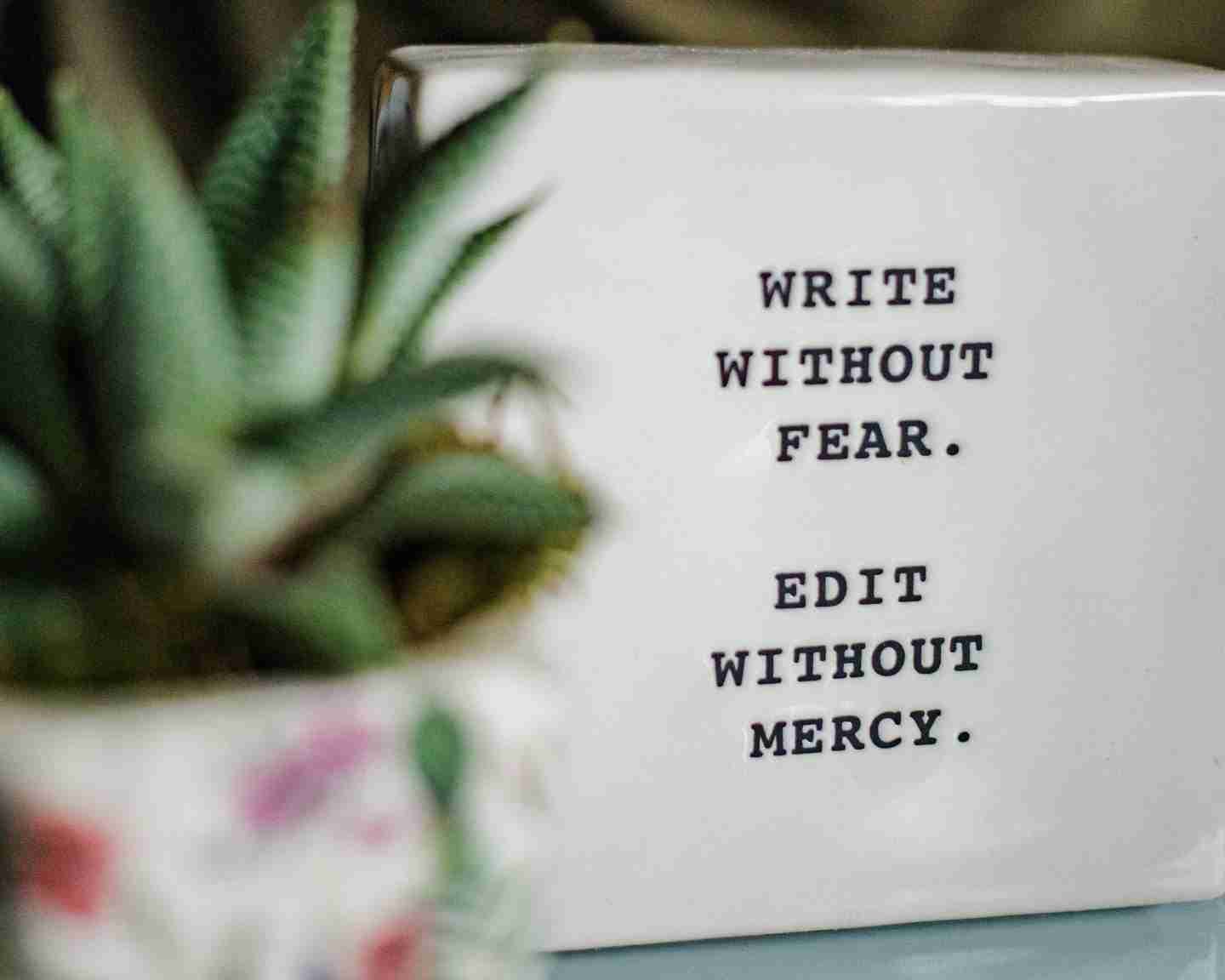
So you have an idea. Something beautiful and inspiring that you wish to bring to fruition as a written piece. But you have absolutely no clue where to start. You’ve never done this before. You’ve never been given any sort of writing advice or guidance, so you’re completely lost. And, with the amount of people out there with the same dream, and only a mere few succeeding, why bother? It will probably come to nothing anyway. Well, if you’re thinking like this, it’s time we slapped some sense into you à la Edna Mode – PULL! YOURSELF! TOGETHER!
Okay, that was a little harsh. But it’s needed. In a way, if you want to achieve your goal of being a writer, you’re gonna have to get over yourself, and any preconceptions society may have. And, once you’ve done that, you’ll have to get started. But don’t know how? Still confused with no help? Well fear not, because here at Nonchalant we have everything to help you propel your idea from a little nugget dancing in your brain to a beautiful written masterpiece. So, absorb the following tips, podcasts and books and soon you’ll be on your way to seeing your best-selling novel on the shelves of every bookstore.
Top 10 Pieces of Writing Advice
1. Destroy the Romanticism of Writing
Imagine yourself in a city coffee shop, looking cute in your turtleneck, typing out a literary masterpiece set to rival Austen or Orwell over a cup of coffee, the sun lightly shining on your face, all with ease and confidence in your craft…then delete that from your mind because that’s BS. If you try to romanticise the writing process, then you’ll end up setting unrealistic expectations for yourself. This will result in you spending more time building the perfect writing scenario rather than actually writing, and ultimately setting yourself up for disappointment when you’re not proactive in the space you’ve created. So, don’t worry about what writing should look like and just…well, write when inspiration strikes. Maybe it will be in a coffee shop. Or it might be when an idea forces you awake at 11pm. Or maybe it’s between talking crap with your fellow writer friend during a video call. That last one sounds too familiar.
2. Sometimes Your Writing’s Best When…You Don’t Write
Kinda off the back of the last point regarding writing when inspiration strikes, sometimes that inspiration strikes when you least expect it. You could be on a walk clearing your mind, you could be listening to the new album by your favourite artist, or you could see someone crying on a train and boom, a new idea forms in your mind – one that could be your writing magnum opus. If this does happen, however, don’t procrastinate on the idea; actually try writing it down to get the ball rolling, and then from there start fine tuning the details. Just a heads up about the crying person though: if you write about them don’t let them know they’re the inspiration – chances are you may make them feel worse.
3. Establish Two Forms of Writing
If you can, try to group your ideas into these two categories:
Practical Projects (PracPros)
Though I’d recommend not writing only thinking of being published and selling, these are essentially the stories you work on with intent to establish your author status. Therefore, you can use these to express a more public version of yourself writing-wise.
Passion Projects (PassPros)
These are the stories with topics you are deep-down passionate about writing, but there are a multitude of reasons you don’t want them to be a work under your name. It could be an uninspired troupe that you can’t help to love reading and writing, or maybe it’s basically a fanfiction. Despite this, you can – and should – still write them to not only practise for crafting your PracPros, but to keep the enjoyment for the art alive.
By establishing these two categories, you can understand who and what you’re writing for with each work. You can also detach the shame from writing whatever you want through realising that not everything you write needs to be read. Speaking of which…
4. Write With Absolute Truth, Imaging No-one Will Ever Read It
Okay, this one kinda contradicts what I said about PracPros, but whatever. Too many authors buckle under the pressure of having to write something that not only needs to be read, but needs to be enjoyed as well. This causes you to end up writing nothing, out of fear it won’t be good enough. Who cares? Sometimes, the lines between PracPros and PassPros can get blurred, and for certain authors their bestseller is something written from the heart only to satisfy one reader: themselves. So you want to write that troupe-filled fanfiction based on those two women in that TV show that should just become a couple already? Go for it! The best types of stories are the ones that you can tell were written with genuine love and passion for the story. And in turn, we as readers feel the love and passion too. So, no matter who or what the inspiration is, just bring the inspiration to life without fear.

5. Writing Exercises Are Your Best Friend
If you cannot find inspiration however, and you find yourself suffering from *shudders* writer’s block, that doesn’t need to be an excuse not to do anything. Online you can find a wide array of writing exercises, ranging from creating new ideas to developing your characters further to even quirky vocabulary-expanding challenges. Hopefully, all of this will get your creative juices flowing to work on something more substantial. Or, even if it doesn’t, fear not: at least you’re moving forward rather than back, and a writing exercise could actually be the seed which grows into something amazing, as is the case for many writers. If you look further down this article, you’ll find recommended an awesome page from Reedsy with all types of writing exercises that will do exactly what we just told you. Or, if you want to find a specific one yourself, then Google’s your friend. Or Bing. But who uses Bing?
6. Find A Common Thread Between All Your Projects
Say you’ve generated a ton of ideas from writing exercises, or you’re just prone to writing short stories and want to write something bigger. I’d recommend looking amongst what you’ve written to find a common theme. It’s likely identifying and using that to bring your works together will lead to a longer, more fulfilling story that you deep down want to tell. Very often it’s characters that fit this brief, as the same character templates pop up in a wide array of story ideas, highlighting a major sign that they need to be in a novel. For the extremely relatable fellow writer Jane from Jane the Virgin, she realised she could create a multi-generational story out of the love stories she’d already written about herself, her mother and her grandmother, so that’s what she did. Look, even fictional writers can be relatable!
7. Kill Your Darlings…or at least put them in a Coma
Unfortunately, though we don’t want to admit it, self-control is a skill required to be a writer – and this includes getting rid of that beautiful scene you’ve just written if in hindsight it isn’t relevant to the story. So you’ve gotta let it go or, as it’s referred to in the writing community, kill your darling. But it’s not fair, you cry, I’ve put my blood, sweat and tears (by BTS) into writing something that I love, and now it’s gotta go? Well, life ain’t fair. Or, you could make it fair, by putting your darlings in a dormant coma instead. This means, whilst you still take it out of your main novel, you can keep it in a separate document so it still exists. This not only makes the idea of editing less painful, but also means you have a bank of beautifully crafted work that could be applied to another part of the story. Or another story overall. Or maybe it could just be there for you to admire and harness inspiration from.
8. If Music Be the Food for Creativity, Play On
There’s only one thing in this world that’s as exciting and dynamic as writing, and that’s music. Listening to a wide array of genres, falling into the production, living through the lyrics and using a song to generate another idea…that could be used for a book! Like mentioned in tip #2, using a song you love as a source of inspiration is just one way music can be used to help with writing. If it helps you, you can use some calming music as a background to fuel your creativity (Taylor’s folklore and evermore are always go-tos – such good writing in them!), or you can create playlists based around your characters, setting or overall ~vibe~ of your novel to listen to. If you’re unsure where to start in creating playlists, just go to Spotify, Apple Music or YouTube where you’ll find what you need. I’m sure an “enemies to lovers arc between a criminal and a scientist set in a suburban city in the 3000s” playlist exists somewhere. Or, even better, why not listen to our queer female artist Spotify playlist whilst you work away?
9. Let Drafts Be Drafts
First drafts make the story exist. Second drafts make the story practical. Third drafts make the story exceptional. Okay, maybe that’s not the exact analogy, but it definitely rings true. Too many writers lack progress on their first drafts because they feel they need to edit what they’ve just written 5 seconds ago. Or, worse, they re-read what they’ve written, hate it, and think it’s not a project worth pursuing. Don’t let that be you! Instead, accept that a draft is just that, and use it as a way to work on your skills and make mistakes. Then, once you’ve fully written ***A DRAFT*** (<- key point!) or your novel, you can then start going back and making the alterations that, had you’d made earlier, would’ve slowed down your writing journey. And forget the analogy at the start, because we think you can use as many drafts as you need for this. A good way to describe this point is: “Build the house first, then decorate it after.”
10. Admit Writing Is Hard
Due to the stigmas around being a writer, most feel like they have something to prove, and will therefore resort to lying. They’ll say they’re whizzing through their novel when they haven’t even gotten past the first chapter. Or, they’ll say that writing is a calm and easy experience. But, like any job, it isn’t. And you should admit it. By admitting writing is hard, it allows you to acknowledge that struggling to get words on a page is just a part of the process and therefore doesn’t make you a failure, especially if you consider your favourite authors have probably gone through the same thing. It also actually makes the process more rewarding; if you’re aware of the effort that has to go into writing, then when you do put in that effort and meet your writing mission for the day (be it write 100 words, complete a writing exercise or even finish your first draft), it’ll feel great to know that you’ve actually worked through the hardness to reach your goal. And this will in turn make you feel appreciative of the things you are doing, rather than feeling guilty over the things you’re not. So, say it with me: writing is hard! And that’s okay!

Now you’ve got those tips in your brain, you should be set to go. But, if you want the experience of writing to feel a little less lonely (because my god can it be sometimes), you need an outlet for your ideas or you need extra advice or activities to launch your creative spirit, then you can check these personally-chosen writing resources below:
Podcasts
The Write Off
If you liked Tip #1, #4, #5, #7 & #10, as well as the whole “build a house, then decorate it” analogy from #9, then you’ve got this short but sweet whimsy of a podcast to thank. Created by two friends who are “everyday” writers as supposed to published authors, this podcast talks about the experiences of juggling both life and writing. They also provide their own advice, from how to well utilise the internet and defining what it means to be a “good writer”, to dealing with professional jealousy and the discomfort around writing sex scenes. This podcast is funny, insightful, and is perfect for anyone who relates to being an “everyday” writer.
You can listen to The Write Off on Google, Spotify and Apple Podcasts.
Fiction Writing Made Easy
Hosted by professional editor Savannah Gilbo, this podcast teaches you the 101 about all things writing, from how to identify the genre of your novel in depth to developing good characters and natural conflict. Each episode is short in length and relaxed in vibe, so it genuinely makes the writing process easier rather than creating extra unnecessary pressure. Gilbo is also very good at using examples from well-known novels, including Harry Potter and The Hunger Games, to dissect her advice, making it more digestible and easier to apply once you’ve seen it in action.
You can listen to Fiction Writing Made Easy on Google, Spotify and Apple Podcasts.
Writer’s Routine
In this fun and long-running podcast, host Dan Simpson interviews authors from all genres and walks of life, and asks them about their writing routines and where their inspiration comes from. Not only do you hear a wide array of anecdotes around the process of writing that will make you feel better about your own routine (or perhaps lack of one), but you’ll be introduced to a bunch of new authors whose novels could become your next bookshelf favourites. Simpson also researches and discusses the routines of the most iconic writers in history, including Sylvia Plath and Maya Angelou. Spoiler alert: many of these included alcohol in some form. To each their own I guess.
You can listen to Writer’s Routine on Google, Spotify and Apple Podcasts.
The Shit No One Tells You About Writing
Bianca Marais, author of critically acclaimed novel Hum If You Don’t Know the Words, has a blast in this podcast, where she has guests on every week to discuss their latest novels and their lives both in and outside of writing. Witty and profound, this podcast shows a different side to authors, showing that they were once just like me and you – people with an idea, a craft and a drive to craft that idea to life – and will therefore inspire you to keep going with your writing journey. Who knows, maybe one day you’ll be a guest on this podcast?
You can listen to The Shit No One Tells You About Writing on Google and Apple Podcasts.
Books
Becoming: A Guided Journal for Discovering Your Voice by Michelle Obama
If you want to use self-reflection to fuel your writing, why not do it with help from the iconic former First Lady herself? Inspired by her bestselling autobiography, Obama encourages and creates space in this personal journal/handbook for you to write down ideas based on many key moments of your life. These include memories of your childhood and people in your life who have inspired you, to your personal style and morning/evening routines. By answering these questions, you can not only get into a more insightful writing headspace, but parts of what you write could be potential fruit for an exciting story. If you fancy, you could turn the book into an in-depth character building exercise by putting yourself in the shoes of your main character, and thinking about how they would answer the questions. We don’t mind how you use it, and we’re sure Michelle wouldn’t either!
You can buy Becoming: A Guided Journal for Discovering Your Voice on Waterstones, WHSmith, Amazon, or at your local bookstore.
On Writing: A Memoir of the Craft by Stephen King
With It, The Shining, The Green Mile and Carrie under his professional belt, it’s easy to say Stephen King knows a thing or two about being a good writer. Which is why, even if you don’t write spine-chilling horrors about killer sewer clowns, we still recommend his part memoir-part handbook to help you become better at your own craft. Taking inspiration from his own fascinating life and relationship with writing, King provides solid advice that will stick with you, engaging you and also encouraging you to work hard to achieve your writer goals.
You can buy On Writing: A Memoir of the Craft on Waterstones, WHSmith, Amazon, or at your local bookstore.
No Mistakes: A Perfect Workbook for Imperfect Artists by Keiko Agena
What if there was the perfect outlet to test the boundaries of your creativity? Oh, there is, and I’m about to talk about it! Created by writer and former Gilmore Girls actress Keiko Agena, this workbook provides exercises on the basis that, in improv, every “mistake” is actually an opportunity to grow. This therefore enables a space for you to reflect on your writing triumphs and failures, celebrating and building on the former and shifting your views on the latter to something more positive. So, if you’re someone who constantly doubts your ideas and thinks they need work, then work on them here in this book. After all, it’s the one rare place that encourages you to make mistakes!
You can buy No Mistakes: A Perfect Workbook for Imperfect Artists on Waterstones, WHSmith, Amazon, or at your local bookstore.
And not forgetting the most important resource…
Your Own Lovely Notebook(s)!
Here’s a wild concept: rather than spending over 40 quid on pretty notebooks just to leave them on the shelf for ~aesthetic purposes~, why not take off the plastic packaging and actually use them? Back to the tip of un-romanticising the writing process, it’s important to start learning that your notes don’t have look “good” – they can just be an excited scrawl of ideas on a page. If you stop procrastinating and actually write your ideas down, then you’ll hopefully get into a “flow” state and the ideas will keep coming and growing into a beautiful project you’ll be genuinely excited to write. And, in our opinion, the only thing better than a pretty notebook is a pretty notebook with amazing ideas inside it.
Some awesome notebooks we’d recommend purchasing are:
- Agenzio Notebooks from Paperchase
- Black & Gold A5 Glitter Notebook from Ryman
- A5 Abstract Rainbow Wiro Notebook from WHSmith
- RuPaul Notebook or Squid Game Notebook, both from Studio by London (purchase via Dolls Kill)
Websites
100+ Creative Writing Exercises for Fiction Authors by Reedsy
Briefly mentioned in tip #5, these creative writing exercises are, in our opinion, the best. Rather than just giving vague prompts to write from (which isn’t bad – we love a prompt!), they actually give detailed descriptions on what the tasks are. They fall under a wide range of categories, from character development to writing dialogue and setting. With all this choice, not to mention that all this choice is 100% free, we guarantee you’ll be able to find a task that will enrich your writing soul.
What are you waiting for? Come and check out the writing exercises and everything else Reedsy has to offer.
Writers & Artists
Writing tips, interviews with beloved authors, opportunities within writing competitions and courses…you want something writing related, this website has it. Whether you’re just trying your hand at writing for the first time or you need an editor and a right to publish, this handy website has a whole library of contacts and advice that you can utilise and help you move to the next stage of your writing journey. All we’ll say is be careful – this website is so abundant you can get lost into it and fall into the trope of “reading and thinking about writing without actually writing”!
Check out what the Writers & Artists website has to offer for yourself.
Tumblr
Okay, hear us out. We know that this blogging website hasn’t always had the best rep, especially as it’s not in its 2013 emo glory days anymore. But, if you go to the right places (the places for writers, obvs), you’ll be able to find a ton of prompts, advice and overall information useful to bringing your story to life. Not only that, but if you want to you can also try and find some stories written on there to garner inspiration. After all, you read to write and you write to read.
Blogs we’d recommend are:
- creativepromptsforwriting – does what it says on the tin by providing a load of great prompts
- writingwithcolor – dedicated to providing tips and inspiration on how to write characters of colour with respect and love

So there you have it. With a gorgeously designed notebook in your hands and a load of great advice and resources under your belt, you’re now ready to bring that awesome idea to life and become the next hot writer.
If you want, let us know what story you’re working on, and what you thought of the podcasts, books and websites recommended by commenting below. As we at Nonchalant are made up of writers too, we’d love to hear from and connect with fellow writers. Speaking of, why not work on your writing skills by becoming a volunteer writer for us?
Happy writing!
Love Team Nonchalant x

